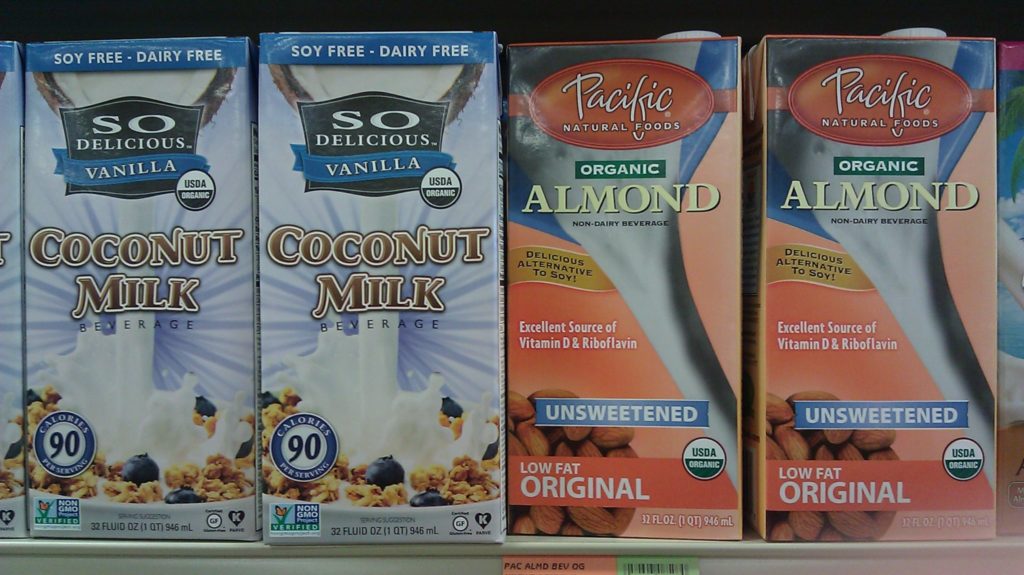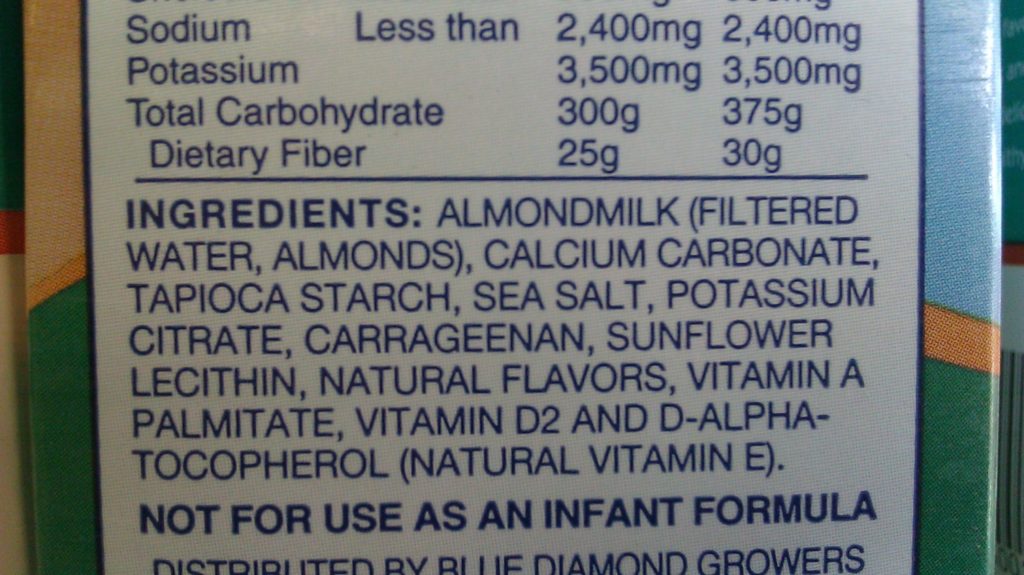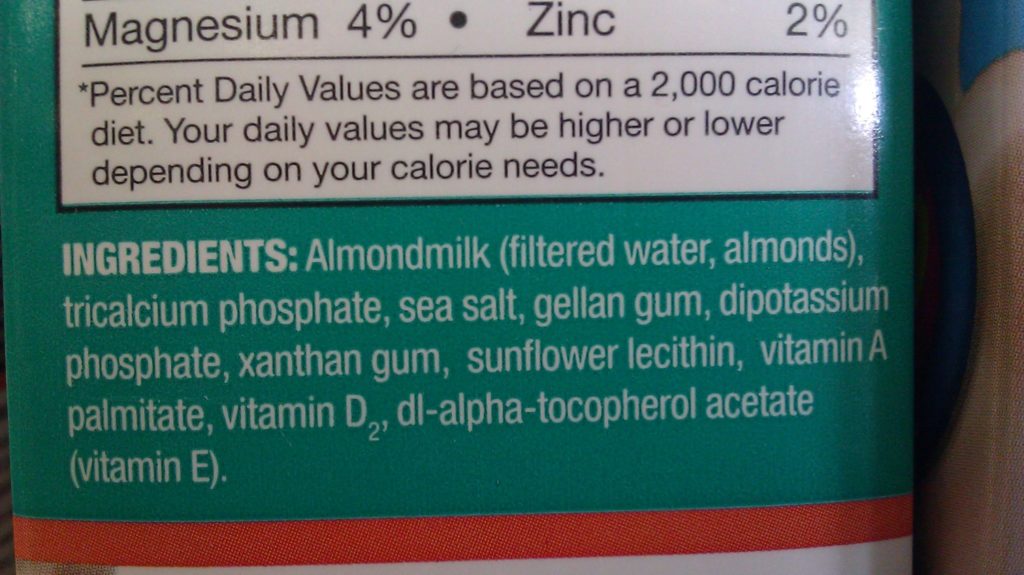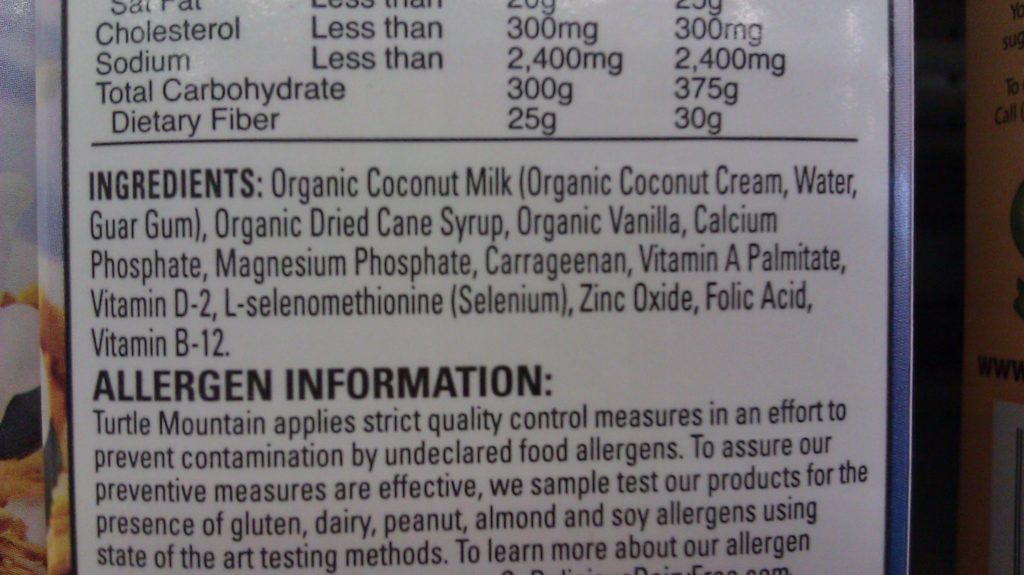 Organic coconut milk and almond milk are common purchases at the health food store by those with dairy allergies. Usually, these people are savvy consumers who know enough nutritionally to avoid soy milk with its endocrine disrupting isoflavones and gastric inflaming phytates. Rice milk is also steadily declining in popularity as it is really not much more than a glass of sugar water nutritionally speaking.
Organic coconut milk and almond milk are common purchases at the health food store by those with dairy allergies. Usually, these people are savvy consumers who know enough nutritionally to avoid soy milk with its endocrine disrupting isoflavones and gastric inflaming phytates. Rice milk is also steadily declining in popularity as it is really not much more than a glass of sugar water nutritionally speaking.
Organic, unsweetened coconut milk and almond milk in cartons seem like great alternatives at first blush, but are they really as “healthy” as people believe?
Let’s take a look at the labels. I was shocked at what I found.
Check out the labels of the three brands I photographed. I checked all the brands, by the way, and they all contained the same dangerous additives I’m about to describe.

First, Vitamin A Palmitate is added, the synthetic version of Vitamin A. I personally avoid synthetic versions of Vitamin A like the plague. Every single multi-vitamin I’ve ever examined contains some form of synthetic A, including the so called “whole foods” multis.
Synthetic vitamins are the chemical mirror images of the real, natural versions. They can cause imbalances over time. Even small amounts of the synthetic fat soluble vitamins like Vitamin A can prove toxic and should be strictly avoided!
The Organic Consumers Association warns that isolated vitamins such as those produced synthetically cannot be recognized or metabolized by the body in the same way as the natural version.

Large doses of natural vitamin A are well tolerated by the body as established by researchers decades ago, however. Traditional diets contain 10 times or more of the RDA of this nutrient with no ill effect. However, synthetic vitamin A is associated with birth defects and bone fractures. It has no benefit in the diet whatsoever.

The second really bad additive in these organic cartons of coconut milk and almond milk is Vitamin D2. Vitamin D2 is a form of the wonder vitamin that you should take great pains to avoid.
In all known cases of Vitamin D toxicity where the dose was intentional, Vitamin D2 was the culprit. By comparison, Vitamin D3 is much less toxic and requires an enormous or even an accidental dose to produce any toxic effect.
Vitamin D2 is manufactured industrially by irradiating yeast. It is dangerous for D2 to be added to any food product particularly if this product would be given to children, where toxicity symptoms would appear at much lower dosages.
None of the store brands of cartoned coconut milk or almond milk were free of these dangerous and synthetic versions of the fat soluble vitamins!
Notice also that carrageenan is present in 2 of the 3 products as well! Dr. Andrew Weil has been telling people to avoid carrageenan since 2002.
Carrageenan is so toxic and inflaming to the human digestive system that this food additive is formally classified by the International Agency for Research on Cancer (part of the World Health Organization) as a potential human carcinogen.
In my view, it would be a mistake to purchase and consume these items. They are in no way health promoting or beneficial, particularly for growing children!
Healthy Alternatives to Coconut Milk and Almond Milk in Cartons
Coconut milk and almond milk should be healthy and they can be if they are produced at home without these dangerous additives. I wrote an in depth post on how to easily make these nondairy beverages yourself. This recipe for wild rice milk is a good option as well.
Believe it or not, even organic coconut milk in BPA free cans would be a better alternative to cartons of coconut milk based on my label inspection!
Check out my video on homemade coconut milk and my article on how to make healthy DIY almond milk, fermented to add probiotics and enzymes to boost immunity and improve digestion.
Sarah, The Healthy Home Economist
Sources
From Seafood to Sunshine: A New Understanding of Vitamin D Safety








Any recommendations for a toddler with cows milk protein allergy and cannot tolerate goats milk either?
Yes, try one of these healthy milk substitutes. https://www.thehealthyhomeeconomist.com/the-three-best-substitutes-for-a-child-allergic-to-milk/
Goya is unfortified.
Your link for your coconut milk BPA free can has guar gum in it.
Guar gum is not a problematic additive for the vast majority of people. Here is more info on it: https://www.thehealthyhomeeconomist.com/xanthan-guar-locust-bean-tara-gellen-gum/
Silk Almond Coconut Milk (unsweetened) tastes like liquid cardboard
They have new almond and coconut milks in plastic carafe shaped bottles in the dairy case at my whole foods with just almonds and water (I didn’t look at the label for the coconut-almond one). I forgot the brands but there were at least 2 different ones. I didn’t check the type of plastic though.
I was excited to learn that Trader Joe’s started selling Organic coconut milk, with no stabilizers, at a good price. Only coconut milk and water. Although not sure if can is BPA free?? I don’t have time to read all the posts above, so maybe someone already mentioned this, but wanted to pass along. 🙂
I read this article and clicked on your recipe for homemade almond milk. It contains 1/4 honey! For a small batch of milk, that’s more honey than I eat in a month. And vanilla/almond extract – why do you add these? I feel like my unsweetened almond milk purchase is healthier than your homemade.
all you need to make nut milk is nut and water. there’s no need to add those unnecessary chemicals to it. if they do, then it’s obvious. isn’t it.
This is a really narrow article with a misleading title. I live in the Netherlands and the coconut/almond milk I buy has 6 ingredients:
water
coconut milk* (4.5%)
agave syrup* (3.5%)
almond* (3%)
sea salt
natural coconut flavour*
It’s a brand called Provamel
and all other brands I’ve tried here also have minimal ingredients and nothing I’m unsure about
Maybe you are just buying the wrong products
So it still has processed sugar/sweetener… and what is “natural coconut flavor”? Not something I’d buy.
I wouldn’t buy it either. European labels are more general than US ones (I’ve observed this as I have had the opportunity to travel pretty extensively not just to Europe but South America, Asia, and Australia/New Zealand as well … doesn’t mean it’s better.
European labels are not “more general” …
every product needs to be evaluated.
In this case the US manufacturers add vitamins and it’s not that common in Europe. The only difference in the label is the way the fats are described.
saturated unsaturated for EU
trans for the Us
I would consider a European label saying “vegetable oil” to indeed be more general. A US label would say the exact vegetable oil used, i.e., canola oil.
Unfortunately that has to do with the difference between US and EU markets.
90% of the products in EU are without the adds and vitamins that sometimes are recommended in the US. – they try to stuff food with a percentage or all the RDA value of vitamines.
Rice milk is not declining ( soy is loosing mkt shares ) and almond is booming… specially in the US.
(where the procurement is much much cheaper)
Agave sweetener is so refined now that I have removed it from my diet…
I make my own coconut milk from organic shredded coconut and water the flour, by product is used for everything I bake… or a thickener for my soups…
It take some effort but it tastes so much better since I’m making it from scratch!
My pint is don’t trust the agave nectar…
Wow you really opened my eyes, definitely coconut and almond milk in cartons is not a healthy buy.Thanks a lot for sharing this and also for the photos you have added. Will surely bookmark this page for all your future posts. I too have some info regarding benefits of almond milk.